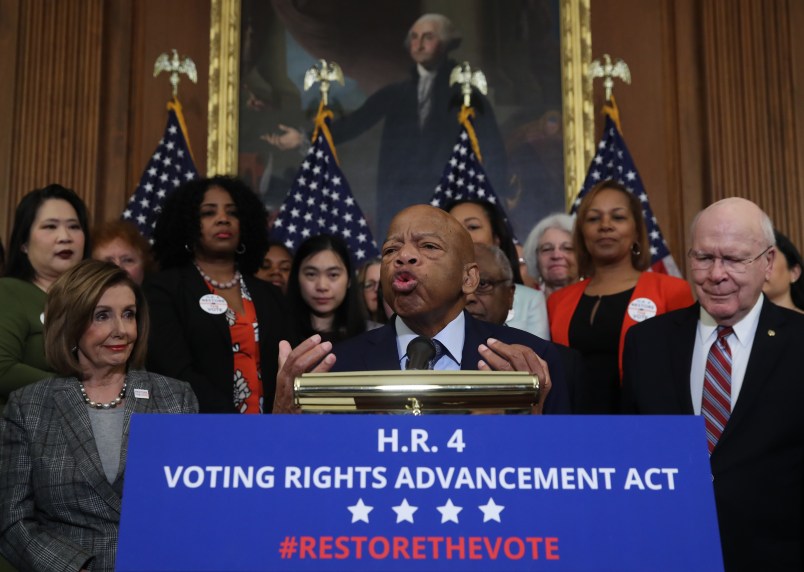While Democrats’ sweeping democracy overhaul HR 1 has run into likely insurmountable obstacles in the Senate, attention has turned to the separate legislative push lawmakers are making to restore the part of the Voting Rights Act that was gutted by the Supreme Court in 2013.
A subcommittee for the House Judiciary Committee held a hearing Thursday to discuss the need for that provision to — which determined which states were required to get federal approval for changes to their election practices — to be revived. Restoring the VRA has long been on Democrats’ agenda, but the current wave of restrictive voting measures, propelled by President Trump’s lies about fraud in the 2020 election, has added new urgency to that effort.
“Congress cannot continue to let these challenges to the VRA go unanswered,” Judiciary Chairman Jerry Nadler, making an appearance to make an opening statement at the subcommittee hearing, said Thursday.
The hearing comes as some members of the Congressional Black Caucus have suggested, according to a Politico report Thursday, that the VRA restoration legislation — known as the John Lewis Voting Rights Advancement Act or HR 4 — should take more of a short-term priority over HR 1, which also includes ethics and campaign finance reforms in addition to its national mandates for ballot access.
“I certainly think our focus ought to be on [the Lewis bill] and voting rights,” Rep. Anthony Brown (D-MD) told Politico.
HR 4 has proceeded on a slower track than HR 1 in part because lawmakers want to create a congressional record that will make Voting Rights Advancement Act more resistant to legal challenges like the one that gutted the VRA in 2013.
Thursday’s hearing was part of that effort. The subcommittee’s majority hosted several witnesses to testify about the suppressive voting measures statehouses have passed since the 2013 Supreme Court decision, known as Shelby County.
The Voting Rights Advancement Act is named after the late Georgia representative who, as a young civil rights activist, was famously beaten while participating in 1965 Selma, Alabama march that jumpstarted in the passage of the Voting Rights Act. Lewis first introduced VRA restoration legislation after previously covered states rushed to pass restrictive voting measures immediately after Shelby County. Versions of it have been reintroduced, but failed to move forward in the House while Republicans held control of the chamber.
According to Politico’s report, the legislation’s drafters are still making tweaks to the version they want to advance now that Democrats have full control of Congress. But some members of CBC are growing antsy, particularly with a redistricting process that, in most states, will start in earnest in late summer. This coming redistricting cycle will be the first one since Shelby County, meaning several states will, for the first time in decades, be able to draw their maps without the federal government confirming that those maps don’t illegally dilute the electoral power of minorities.
There is also a belief among some that HR 4 stands to get at least a few Republican votes in its favor, particularly from the Republicans who supported the 2006 VRA authorization. Republicans have remained united in their opposition to HR 1 and it does not even have the support of all 50 Democrats in the Senate, let alone the buy-in from them that would prompt Democratic centrists to blow up the filibuster to pass it. HR 1, which has already passed the House, will get a Senate mark-up next month. The exact timeline for passing the HR 4 out of the House and getting it over to the Senate remains unclear.







This really will be a big deal if they can push it through, and considering how the last one passed Congress it should go through easily. Republicans will balk though, because they do most of the map drawing that violates the act, but having all districts require clearance would go a long ways to make sure the system is at least not biased. You can bet far worse will be coming when Republicans start their gerrymandering in the states they control.
We need even more, which is where HR 1 comes in, but restoring the VRA should be something every American gets behind.
”Clap louder so Tinkerbell will live!!!”
This might be a winning strategy, if enough reps get behind it. As long as HR1 contains campaign finance reform,it’s going to be harder to get passed.
If you haven’t seen this you should take a few minutes to watch Sen. Kennedy get made a fool of .
Everything the GQP is going to do for the next year and half is try and scare the swing voters in suburbia by saying that Dems play the race card. FUll stop. Its all they have and it might work in certain districts.